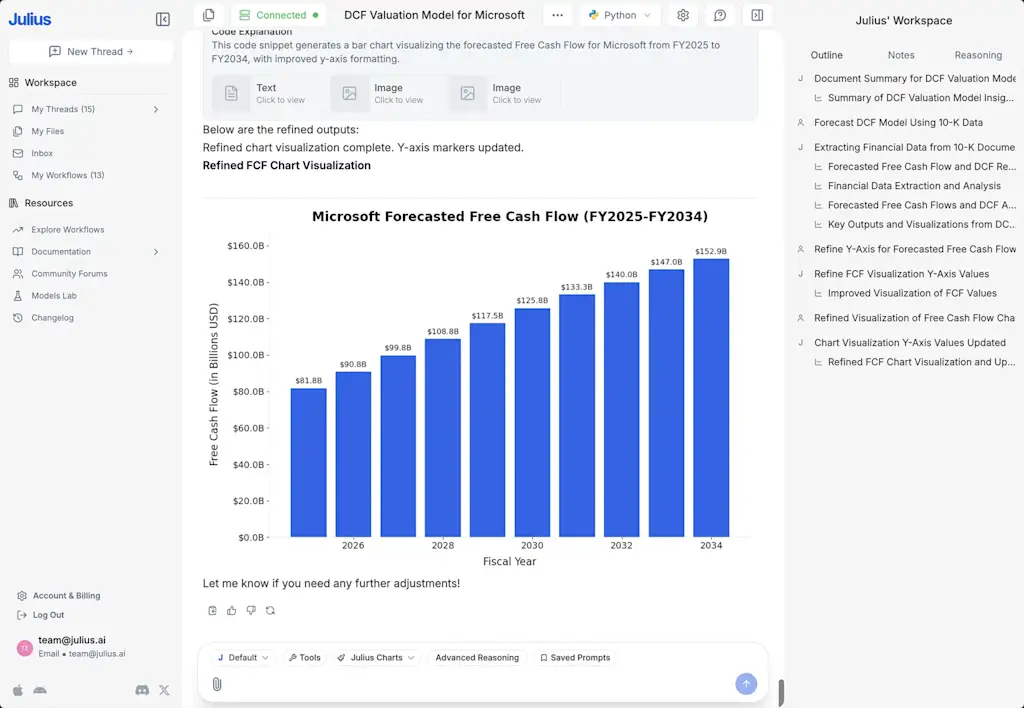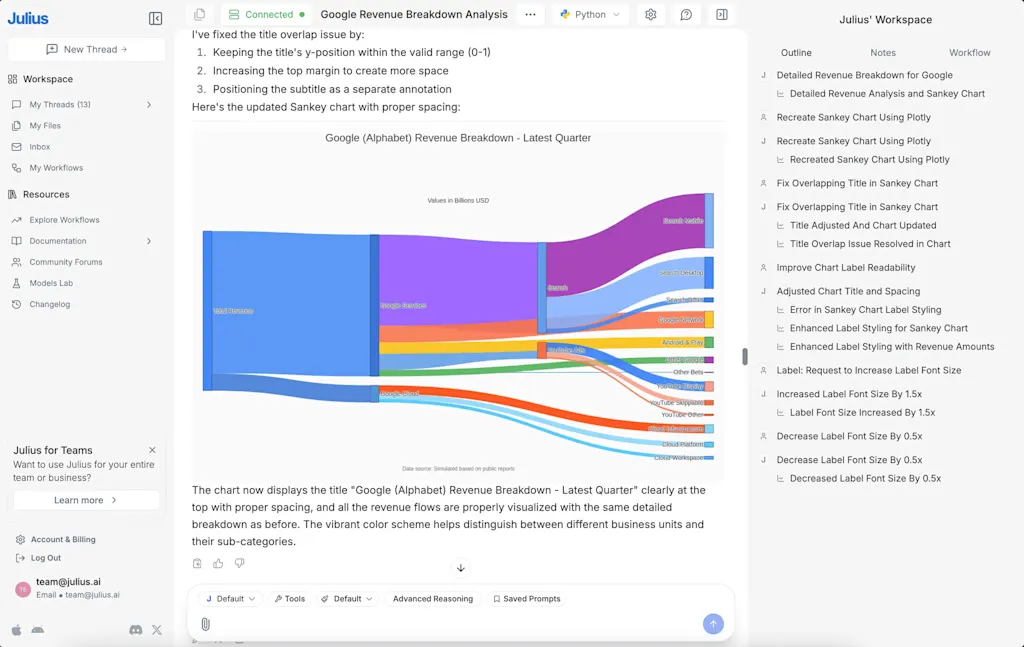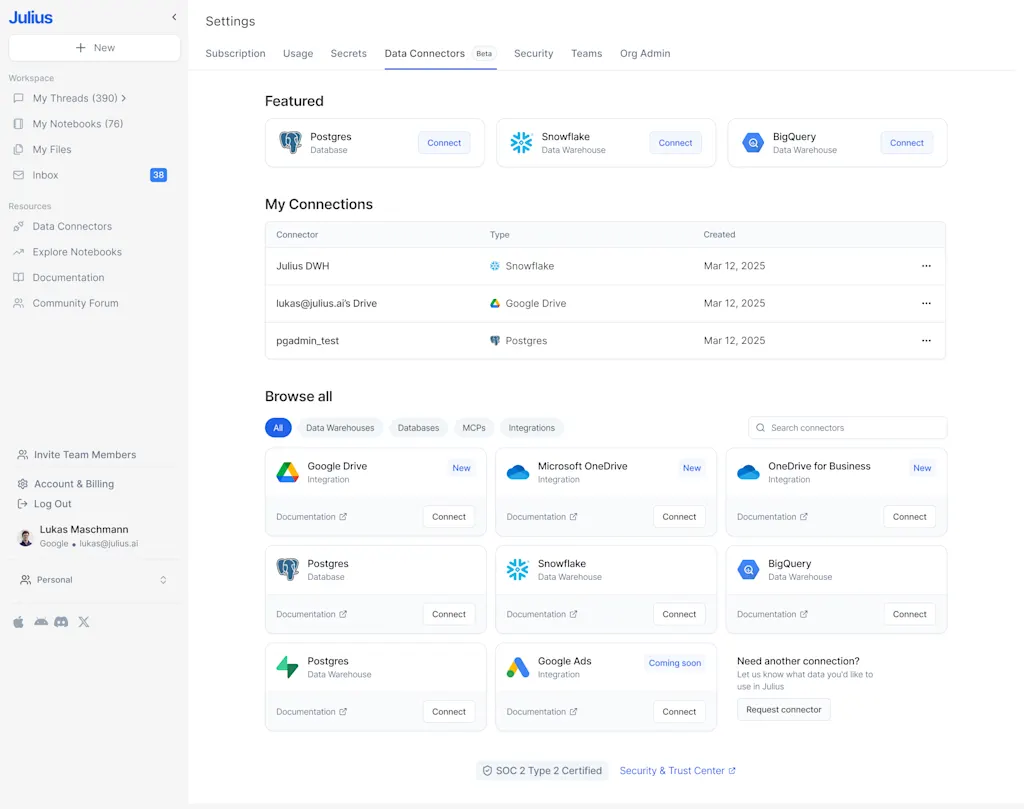Businesses have spent the past decade or more amassing vast amounts of data on customers, sales, and nearly everything else measurable. Yet everyday employees—and even C-suite leaders—often struggle to work directly with these datasets, which typically require specialized technical skills to access, analyze, and query.
Julius AI, a startup founded in 2022, claims to have a solution. It offers AI that allows users to ask questions in plain English, like “Why is our revenue going up?” or “Can I see a pie chart of sales by region?” The system then automatically generates code in languages like Python to deliver the required answer or data visualization, often within seconds, along with a written explanation of the process.
Previously users would have needed to submit questions to their company’s data science team, wait for clarifying questions, and then receive a response or link to a chart. Now they can simply talk to Julius.
“They can just ask questions and get instant insights,” says founder and CEO Rahul Sonwalkar. “And then they [can] ask a lot of follow-up questions.”
So far, the tool has generated roughly 10 million data visualizations for users and produced an additional 4 million lines of code every day, Sonwalkar says. It’s also the tool of choice in Harvard Business School’s “Data Science and AI for Leaders” class, now required for every incoming MBA student.

For data scientists, Julius allows more time to focus on long-term projects, rather than handling a constant stream of ad hoc questions (and follow-ups) from colleagues. And when needed, they can use Julius themselves.
The interface resembles a Jupyter notebook (commonly used by analysts for step-by-step workflows and visualizations) but with the added ability to input plain English, alongside code in Python, SQL, or R. This saves even experienced programmers the effort of looking up obscure syntax or remembering exact database table and column names. While those familiar with coding can edit the AI-generated code, most users don’t—and that’s okay.

“Most of our users don’t know what Python is,” Sonwalkar says.
Julius recently raised $10 million in a funding round led by Bessemer Venture Partners and now has nearly 2 million users. The company is continuously expanding its capabilities to better handle sprawling enterprise data. Initially, users had to upload files like spreadsheets, but the tool can now connect to popular database and data warehouse platforms such as PostgreSQL and Snowflake. The AI can analyze database layouts to understand what’s stored where, share that information with users, and build deeper contextual knowledge over time, Sonwalkar says.
Julius is currently preparing integrations with other key business data sources, like Google’s advertising tools, as well as working toward compatibility with established business intelligence platforms, aiming to replicate and enhance analyses already in use.
The company is also working on enhanced support for visualization dashboards, along with scheduled queries that automatically refresh with new data on a regular basis, both common features of business intelligence software. And for users weary of checking dashboards to see whether any numbers have gone up or down unexpectedly, Julius expects to add notifications that can let users know if something noteworthy appears in the data.

“There’s a dashboard fatigue in companies,” Sonwalkar says. “There are 50 dashboards that each team monitors every week, and most dashboards honestly don’t change.”
But when they do, users will be able to ask Julius for an explanation and direct it to explore the underlying metrics, which traditional dashboards don’t allow without manual coding.
Julius isn’t alone in pursuing AI-driven data science. Many data providers, from polling giant Morning Consult to various sales and marketing platforms, have added AI to help customers explore their datasets more intelligently. Established business intelligence tools are also layering in AI interfaces, while leading AI companies like OpenAI and Anthropic have launched their own data analysis tools.
Still, Sonwalkar contends that Julius offers more robust features and deeper data source integrations than the AI tools from the big labs—and is built from the ground up to help everyday users interact intelligently with data, rather than layering AI onto existing legacy systems.
“We’re rebuilding the experience from scratch,” he says.
Ak chcete pridať komentár, prihláste sa
Ostatné príspevky v tejto skupine

AI-generated “models” have now made their way into the hallowed pages

Tesla has signed a $16.5 billion deal to source chips from

Estée Laundry, the anonymous Instagram account and self-proclaimed beauty industry “watchdog,” is back after a two-year hiatus.
Estée Laundry—the name a play on beauty giant Estée Lauder

The AI companion space will soon see another new entrant. Elon Musk, t

There’s an air of panic in the media world. The specter of AI ha

Costco is well-known for its no-questions-asked return policy. Now some shoppers are tak

Back in 2008, The Atlantic sparked controversy with a provocative cover story: “Is Google
